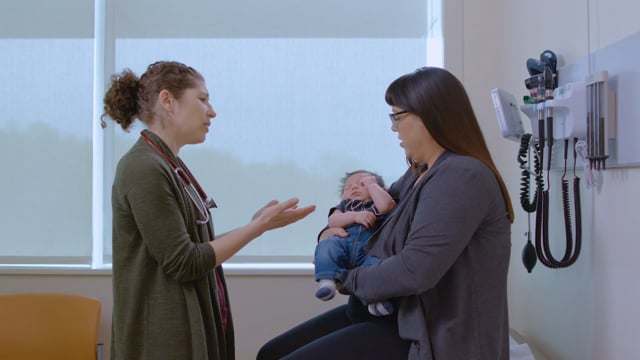Your Child's Vaccines: Rotavirus Vaccine (RV)
What Is the Rotavirus Vaccine?
The rotavirus vaccine protects against rotavirus, a common cause of vomiting and diarrhea, especially in infants and young children. Childcare centers are common sites of rotavirus outbreaks.
It is a live attenuated vaccine, which means it contains a weakened form of the virus.
When Do Kids Get the Rotavirus Vaccine?
The vaccine is a liquid given by mouth. Children get it at ages 2 and 4 months, and some might get it again at 6 months, depending on the brand of vaccine used. The first dose must be given by 15 weeks of age, and the last dose by 8 months of age.
Why Is the Rotavirus Vaccine Recommended?
Rotavirus can cause severe diarrhea, which can lead to dehydration. Some kids who get it need care in a hospital. Giving the vaccine to child doesn’t only protect the child, but also helps stop the spread of rotavirus in a community.
What Are the Possible Side Effects of Rotavirus Immunization?
The vaccine can cause diarrhea, vomiting, and a fever.
Rarely, intussusception might happen within a week after the first or second shot. Intussusception is a type of bowel blockage that can happen in babies and young children. But rotavirus infection is much more likely to cause intussusception than the vaccine.
As with any vaccine, there is a small risk of an allergic reaction.
When to Delay or Avoid the Rotavirus Vaccine
Simple colds or other minor illnesses should not prevent vaccination, but your doctor might choose to reschedule the vaccine if your child has a more serious illness.
Talk to your doctor about whether the vaccine is a good idea if your child:
- had any allergic reaction to an earlier dose of the vaccine or its components, which include latex
- has a disorder that affects the immune system (such as cancer or HIV/AIDS)
- is getting steroids or other medicine that weakens the immune system (including chemotherapy or radiation therapy)
- has severe combined immunodeficiency (SCID), a genetic disorder
- had intussusception in the past
Your doctor may decide that the benefits of vaccinating your child outweigh the possible risks.
Caring for Your Child After the Rotavirus Vaccine
For fever, check with your doctor to see if you can give either acetaminophen or ibuprofen, and to find out the right dose.
If your child has vomiting or diarrhea, give small amounts of liquids often and watch for signs of dehydration, such as less urine (pee) than usual.
When Should I Call the Doctor?
Call the doctor if:
- You aren't sure if the vaccine should be postponed or avoided.
- Your child has problems after the vaccination.
Watch your child for symptoms of intussusception such as:
- intense belly pain with uncontrollable crying
- vomiting
- blood or mucus in the poop
- weakness, drowsiness, or fussiness
Call your doctor right away or go to the hospital if your child has any signs of intussusception.

How Vaccines Help
Vaccines keep millions of people healthy each year by preparing the body to fight illness. Learn how vaccines help and get answers to your biggest questions about vaccines.
Reviewed by: Elana Pearl Ben-Joseph, MD
Date Reviewed: Aug 2, 2024
















